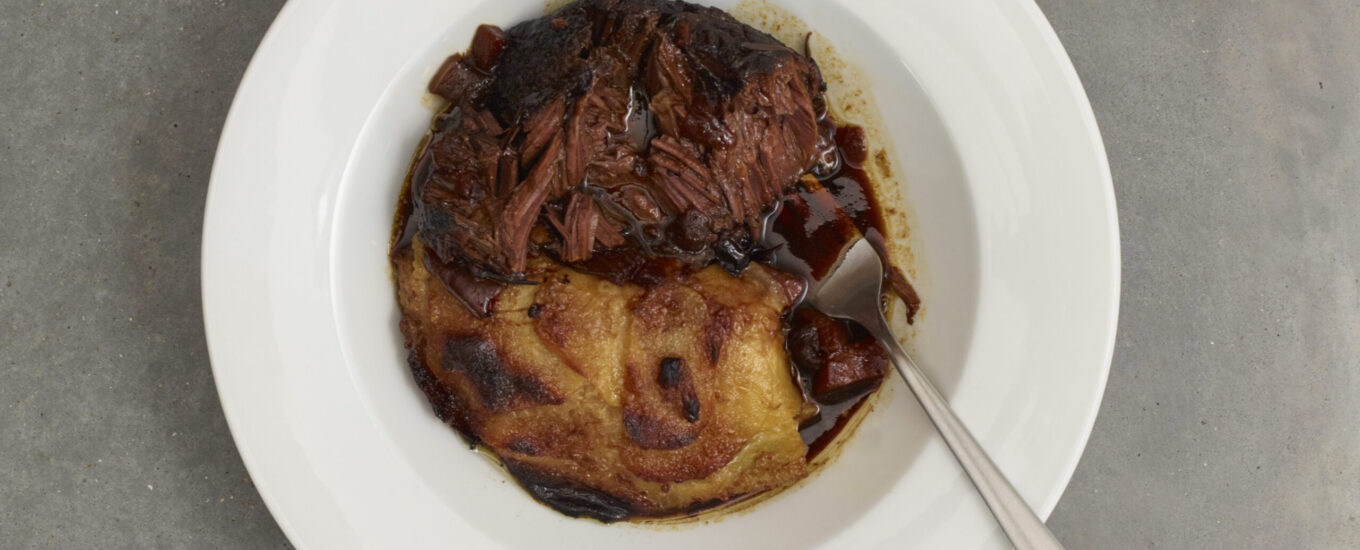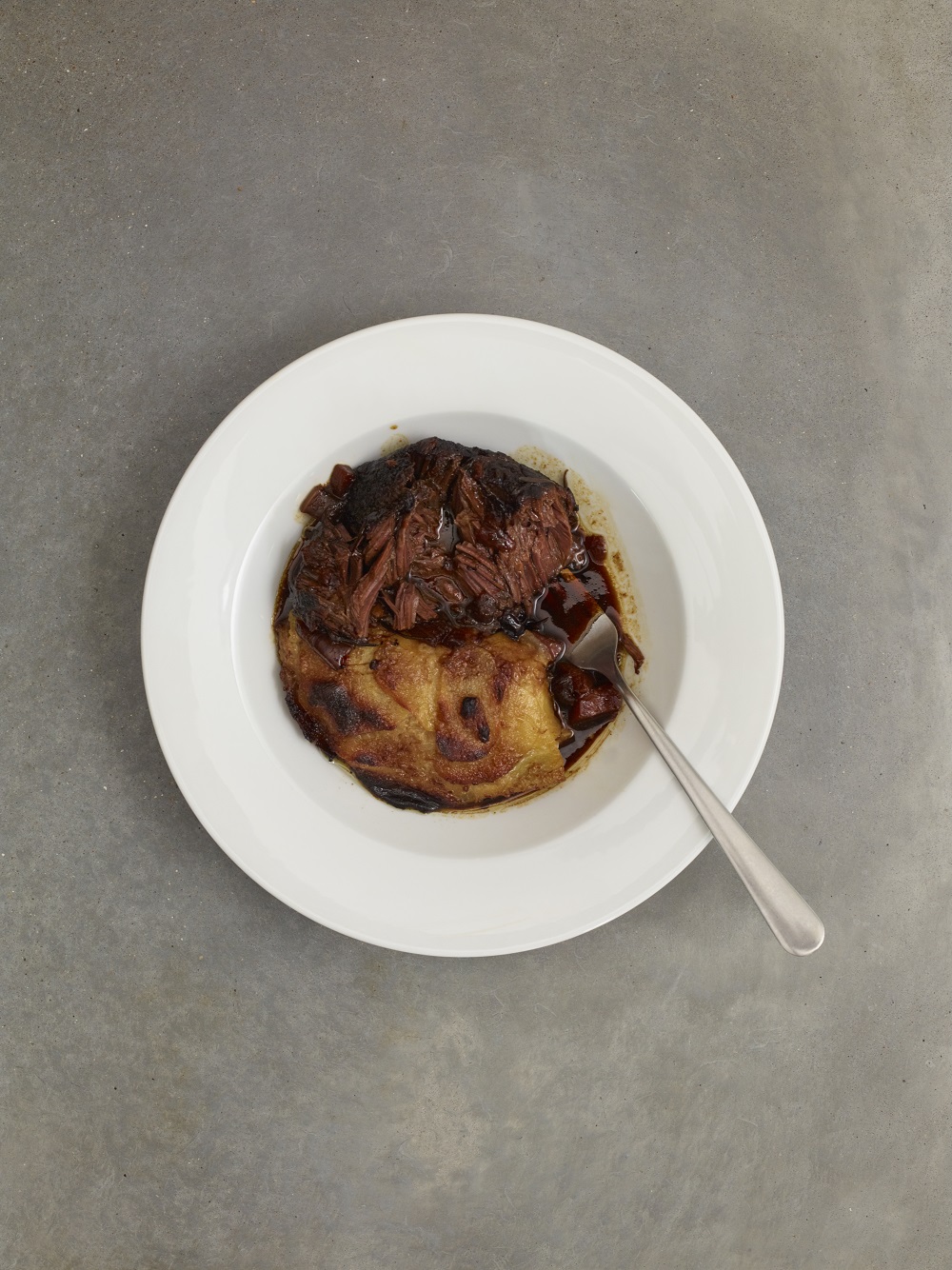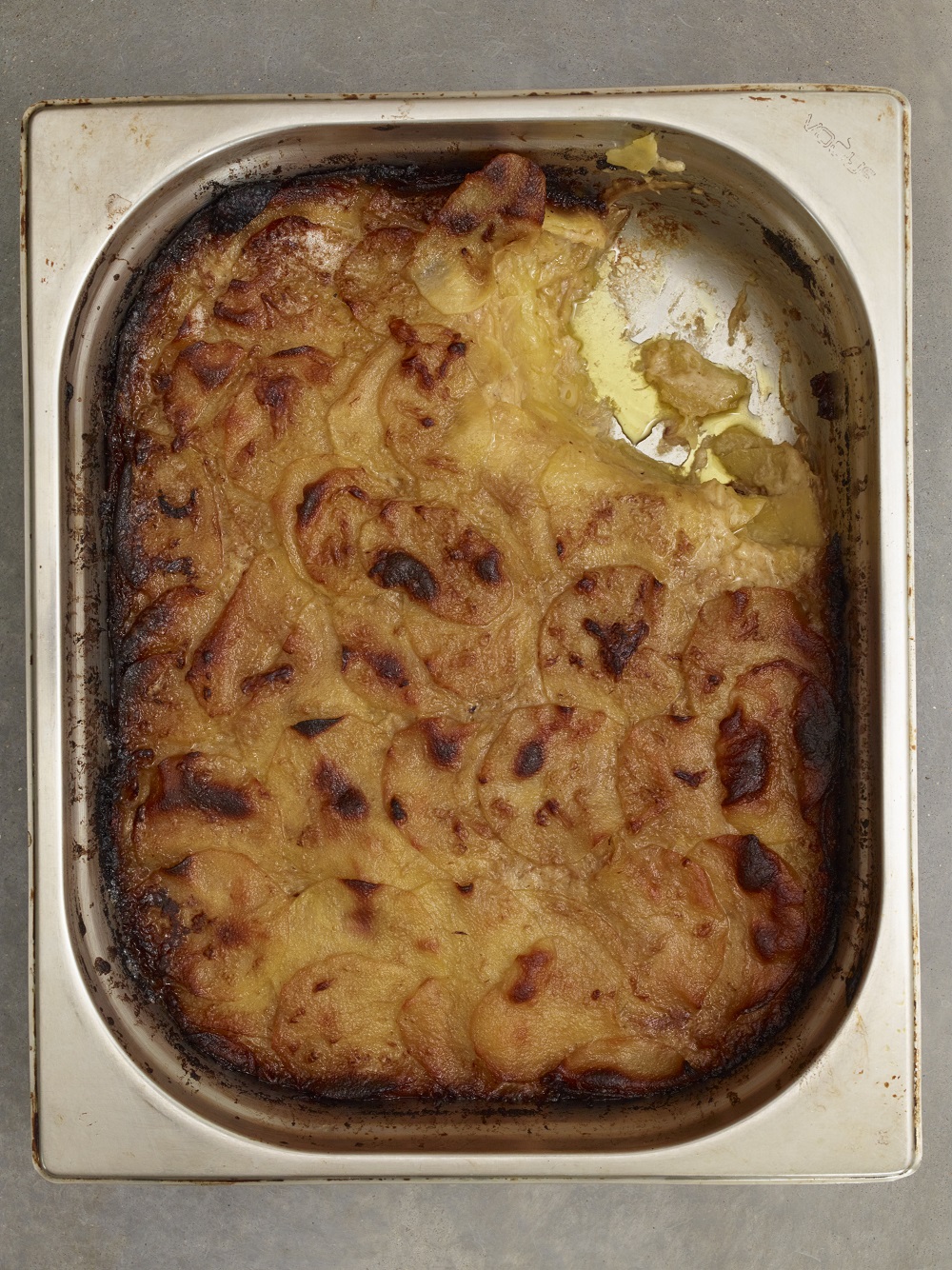Recipe | Braised Beef with Jansson’s Temptation, by The Garden Cafe
STORIES

The Garden Café: A Year in the Kitchen is a new cookbook written by Garden Café head chef George Ryle, a small collection of some of the dishes that he has most enjoyed cooking and serving at the Garden Museum. With recipes selected from each of the seasons, the book is a journey through a year in our kitchen. To celebrate the release of the book, we’re sharing a sneak peek inside with this recipe from the Winter chapter! George’s pro tip: “if you don’t want to hate me, yourself, or this recipe, then make sure you give yourself plenty of time to prepare and cook this.”
Braised Beef with Jansson’s Temptation
Jansson’s temptation doesn’t sound like food really, does it? But food it is, and pretty spectacular food at that. If you haven’t tried it before then prepare yourself for fireworks. It’s a really, really good thing. It’s a Swedish potato dish, similar, in theory, to potato dauphinoise but unique in the addition of lots of sweet onions and, even more importantly, a hell of a lot of anchovies. It works so, so well – I’m tempted to say better than the sum of its parts, such is its excellence, however as I think about it I realise that its parts are all excellent: cream, potatoes, onion, and anchovies. Perhaps equal to the sum of its parts would be more apt. It just so happens to be the perfect accompaniment to rich, unctuous beef cheeks, slowly braised in red wine and beef stock. It is, however, a dish that should probably not be eaten too many times in a week, or even a month, but it is the perfect family dinner on a Sunday night in the depths of winter. A salad of winter leaves, the colourful bitter ones from northern Italy, might make a welcome addition. Cheeks, it must be mentioned, are good pretty much wherever they come from, beef or pig, cod or monkfish, it’s a great muscle to eat. Here it is beef that waves the flag for the gloriousness of cheeks – braised in wine and stock, to the point where a spoon is all that is required to split them in half (that’s a satisfying moment). This is a crowd-pleaser, plain and simple.

Serves 4
For the cheeks:
2 large or 3-4 small beef cheeks, ask your butcher to trim them up for you
2 tablespoons of flour
salt
black pepper
3 medium onions, peeled and finely diced
1/2 a head of celery, finely diced
2 carrots, peeled and finely diced
5 cloves of garlic, peeled and finely diced
600ml of beef stock
2 glasses of red wine
2 sprigs of sage
2 sprigs of thyme
4 bay leaves
1 star anise
For the Jansson’s temptation:
4 medium onions, peeled and very thinly sliced
100g butter
1/2 a bunch of thyme
salt
15 anchovy fillets
6 large waxy potatoes
600ml of double cream, peeled and sliced as thinly as possible (use a mandolin if possible)
The best place to start is with the beef cheeks, they will need the best part of 4 hours. Preheat the oven to 140c. You will need to find a casserole pan, one that you can use on the stove and then put in the oven, with a lid, for several hours.
Put the pan on the stove on a medium heat with a tablespoon of olive oil. Season the flour with a good pinch of salt and a couple of grinds of black pepper, then dust the beef cheeks with the flour, making sure that it is coated all over but without too much excess flour – give them a little pat – then begin to brown them off in the pan. Be careful here that the heat isn’t too high as it will burn the flour. Once they are coloured on all sides and looking delicious, remove them from the pan, place them on a plate, and replace them with the diced onion, celery, carrot, and garlic and a pinch of salt, and allow them to sweat down and soften gently, stirring frequently. After about 12-15 minutes, once the vegetables are soft and sweet (a little bit of colour is fine) add the red wine, the beef stock, the star anise, and the herbs – if you have some butchers twine or string then tie the herbs together in a little bundle. Give everything a stir and allow it to come up to a simmer, then put a lid on the pan and put it in the hot oven for at least 3 hours.
Whilst the beef is cooking you need to begin preparing the temptation. The onions are the place to start; peel and slice them quite thinly and then put them in a pan, with the butter, a pinch of salt, and the thyme. Put the hob on a low heat and very slowly let the onions soften with a lid on, stirring them regularly. Be very patient here, the onions need to be really soft and sweet, without much colour – they probably need 40-50 minutes. Once the onions are soft add the anchovies and continue to cook for another 10 minutes, they will disappear into the onions, culminating in an intoxicating sludge of umami. Add the cream, stir and then take them off the heat to sit and infuse. Once it is cool enough, pick out the thyme stalks. After about 20 minutes, once the flavours have had a chance to infuse, give it a try. They need to be highly seasoned – raw potatoes can take a lot of salt.
Preheat your oven to 165c. Peel the potatoes and slice them, thinly on a mandolin, about the thickness of a 5 pence piece. Begin laying them in an oven-proof dish and then, once you have a completed layer, dollop a good spoonful of the onions and cream over them, spreading it out evenly. Repeat for as many layers as you have potatoes and the onions. The top layer should be potatoes. It is important to make sure that there is enough cream in the dish. The potatoes are going to soak up a lot of the liquid, so if there is not enough cream then the final product will be quite dry, which is not what you want. It should have a sloppy appearance. Cover the top of the dish with some tinfoil and place it in the oven for 20 minutes, at which point remove tin foil and cook for another 30 minutes until you have a nice golden brown top. To test if they are cooked simply prod the potatoes with a knife; it should pass through without resistance. If you can feel the layers of potatoes giving up a fight then it needs a little more cooking.
After 3 hours, check the beef cheeks – they should be soft and yielding under pressure from a spoon or knife. If they are cooked then remove them from the oven and assess the sauce; it should be slightly viscous, similar to gravy. If it is looking a little thin then remove the cheeks and put the pan back onto the stove to reduce slightly, over a medium heat, stirring frequently. Once the sauce is at the right consistency you are ready to serve. Break the cheeks in half, spoon over some sauce, and pop a good wedge of Jansson’s temptation next to it. Winner.
The Garden Café: A Year in the Kitchen is available now in the Garden Museum Shop and on our website: order a copy
